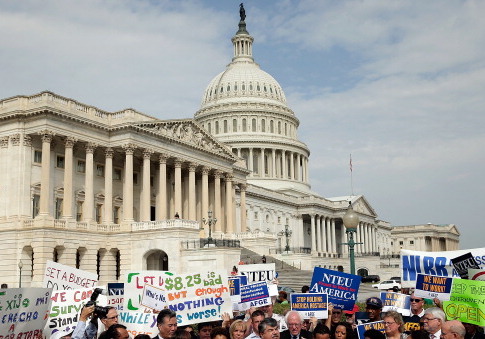Government employees spent nearly 3.5 million hours conducting union business, costing taxpayers $162.5 million in 2014, according to a new report.
The Office of Personnel Management (OPM) revealed that official time increased by more than 10 percent between 2008 and 2014—the most recent data available. Official time is the practice of allowing a federal worker to remain on the clock even as he conducts business for his labor organization, rather than his government job.
OPM found that employee representatives logged 3,468,170 hours doing official union activities in 2014, a 20 percent jump from the 2008 fiscal year. OPM concluded that official time cost taxpayers $162.5 million based on average salary and benefits payments made to federal workers, a $5 million increase from 2012.
Union representatives increased their time away from the job by 30,000 hours from 2012, according to OPM, which surveyed more than 50 agencies to complete the report. A minority of departments was responsible for the increase, while the majority actually reduced the use of official time.
"Thirty-seven agencies reported reductions in the total number of official time hours used whereas twenty (20) reported increases and four (4) reported no changes in the total number of official time hours used," the report found.
Smaller agencies with fewer union members experienced the largest increases in official time, which can involve grievance or discipline issues, as well as bargaining. The International Boundary and Water Commission, which maintains international waters standards along the U.S.-Mexico border under the State Department umbrella and employees fewer than 1,000 workers, experienced a 543 percent increase in official time between 2012 and 2014. Union representatives logged 135 hours on official time up from 21 in 2012.
The State Department overall witnessed a 50 percent increase over that time period. Homeland Security also witnessed a 30 percent climb in official time from 2012 to 2014. That increase coincided with Transportation Security Administration (TSA) workers ratifying a union contract with the agency in 2012. The TSA employs more than 40,000 airport screeners and other security officers, a large portion of the 240,000 people who work at DHS.
These gains were offset by declines at other large agencies, including the Department of Agriculture, which fell 10 percent, the Energy Department, down 50 percent, and the Treasury Department, down 13 percent.
The increase in union activities came despite the fact that union membership in the federal workforce has fallen in recent years. Unions represented 1.2 million non-postal employees in 2014, a 1.5 percent drop from 2012. Unions lost about 20,000 members in the past two years, following broader labor trends in which union membership has fallen to historic lows in the post-World War II era.
Union watchdogs have targeted official time at the state and local level in recent years. Groups in Pennsylvania, Texas, New Jersey, and Arizona have launched lawsuits challenging the practice as a misappropriation of public taxpayer dollars for the benefit of a private organization.
Trey Kovacs, a labor policy expert at the pro-free-market Competitive Enterprise Institute, said the Trump administration should cut down on the practice to fulfill his campaign promises to pare back the budget to offset increased military spending. He said spending money on official time distracts from "real priorities, like veterans' services or environmental protection."
"Most taxpayers have no idea that their money is spent paying federal employees to perform union business unrelated to their public duties," Kovacs said in a statement. "Employees on official time are off lobbying on behalf of their union, attending union conventions, or doing some other union-related business. The Trump administration and Congress should waste no time in eliminating this subsidy for federal employee unions."
